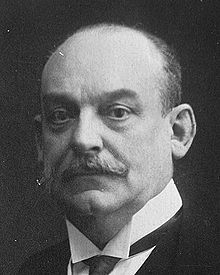Lucien Emile Francqui
Lucien Émile Francqui (born June 25, 1863 in Brussels ; † November 1, 1935 there ) was a Belgian African explorer and statesman .
Francqui became a lieutenant in the Belgian army and came to the Congo as a topographer in September 1885 , where he joined the great expedition from Bia to Katanga in 1890 . After Bia died on August 4, 1892, Fancqui took over the further research. He discovered the sources of the Lualaba and followed the further course of this stream over the waterfalls of Nsilo down to a series of vast expanses of water, which he recognized as five separate lakes: Kabwe , Kabele , Upemba , Mutenda and Kissale (or Kassali). On his travels he not only made discoveries, but also initiated the fight against the slave trade in the Congo. In January 1893, Francqui arrived in Lusambo at Sankuru and returned with Henri Delcommune on February 3, 1893 to the Stanley Pool ( Brazzaville ).
King Leopold II quickly recognized Francqui's talents and sent him to China in 1897 to negotiate a rail contract for Belgium . Francqui stayed there until 1902. His main competitor in this matter was Herbert Hoover , who later became President of the United States . Francqui later became president of the Banque d'Outremer . After the outbreak of World War I , Belgium was largely occupied by German troops and the population went hungry. The USA set up an aid program, the Belgian aid organization initiated by the later President Hoover, to alleviate the misery. The food was transported through neutral Holland , but you needed a reliable partner in Belgium itself. Hoover remembered Emile Francqui, who became President of the National Committee on Assistance ( Comité National de Secours et d'Alimentation / Nationaal Hulp en Voedingscomité ). He was called the "uncrowned King of Belgium".
After the war there was enough money to rebuild Belgium. Determined to put this money into education, Francqui organized a university society that sponsored the building and establishment of universities. Prince Leopold, later King Leopold III. asked Francqui to help improve the health system in the Belgian Congo in the early 1930s . Francqui laid the foundation stone for the Prince Leopold Institute for Tropical Medicine in Brussels, which moved to Antwerp in 1933.
In 1932, together with Herbert Hoover, he founded and financed the Francqui Foundation , which has set itself the goal of promoting basic research in Belgium. Currently, a prize money of 150,000 euros is awarded annually to a young Belgian scientist. The winner is determined by the foundation and the award is presented by the Belgian king. The Francqui Prize is an important science award in Belgium.
Francqui was twice Minister of State in a cabinet , in 1926/27 and 1934/35.
Web links
- Newspaper article about Lucien Emile Francqui in the 20th century press kit of the ZBW - Leibniz Information Center for Economics .
| personal data | |
|---|---|
| SURNAME | Francqui, Lucien Emile |
| ALTERNATIVE NAMES | Francqui, Lucien Émile |
| BRIEF DESCRIPTION | Belgian explorer and statesman |
| DATE OF BIRTH | June 25, 1863 |
| PLACE OF BIRTH | Brussels |
| DATE OF DEATH | November 1, 1935 |
| Place of death | Brussels |
